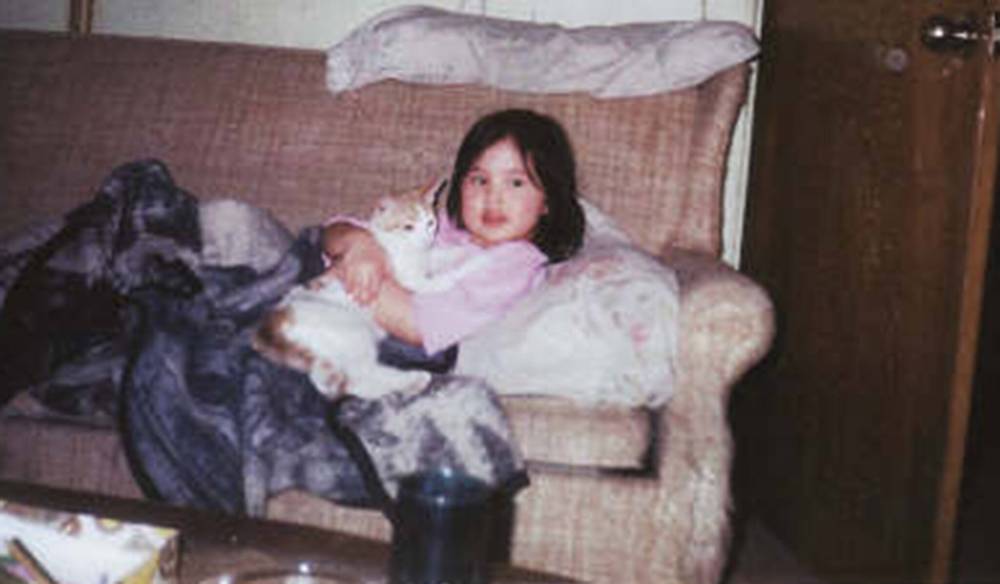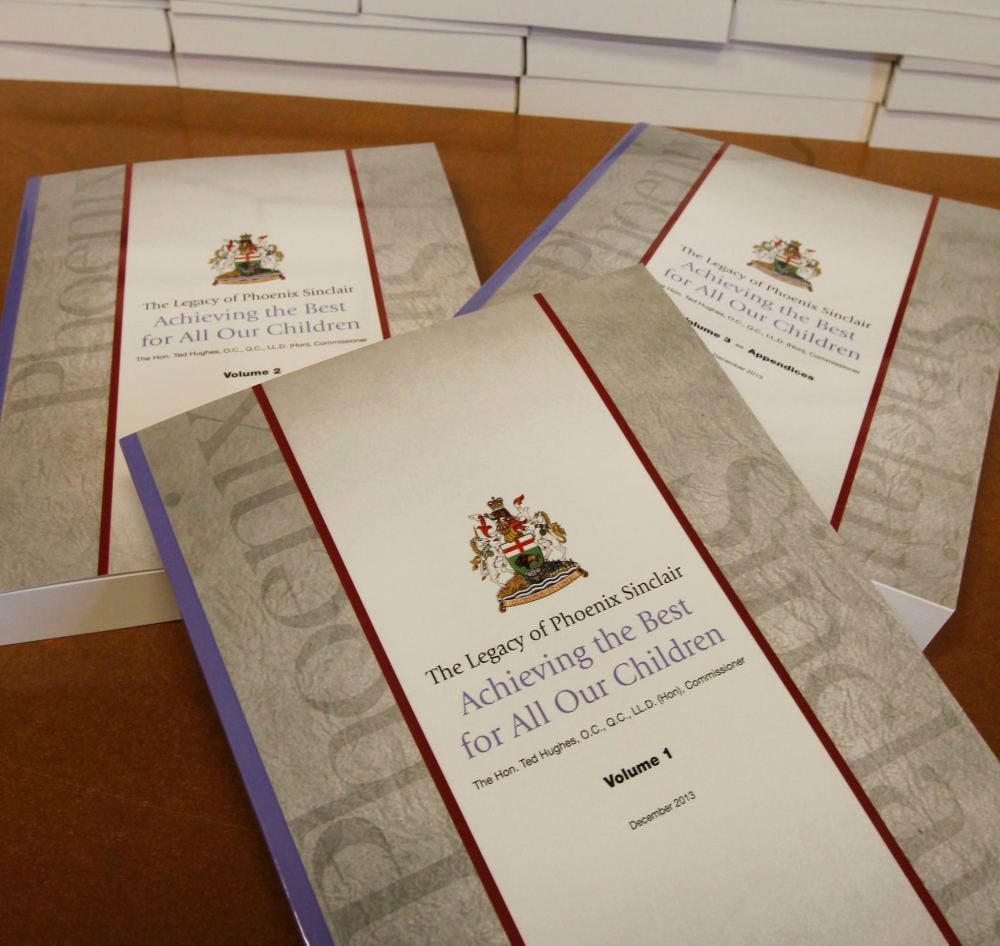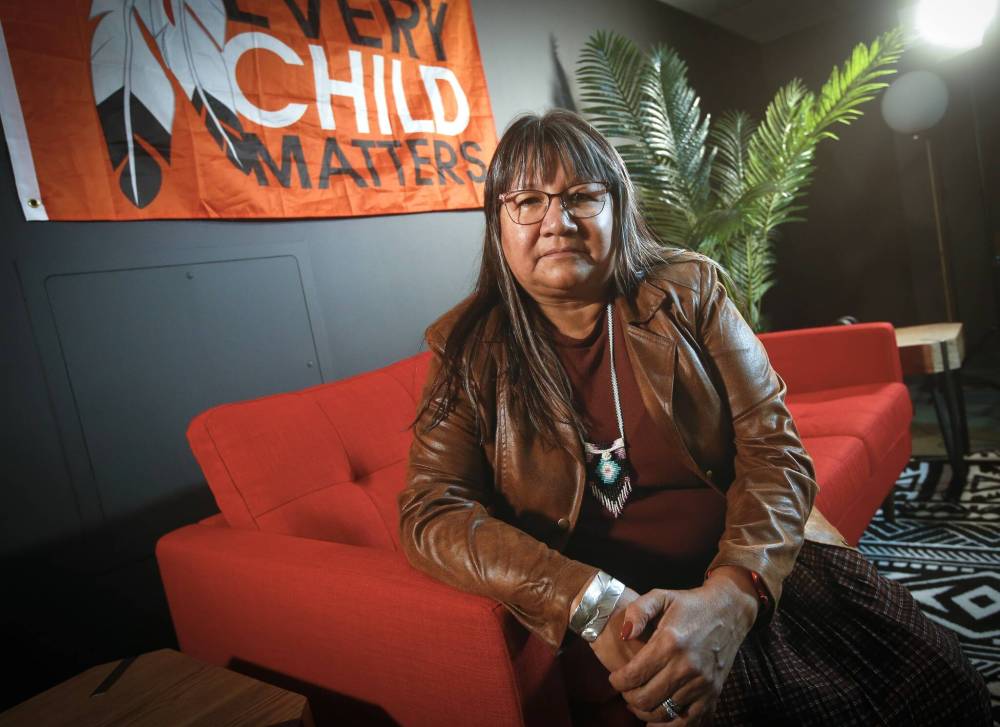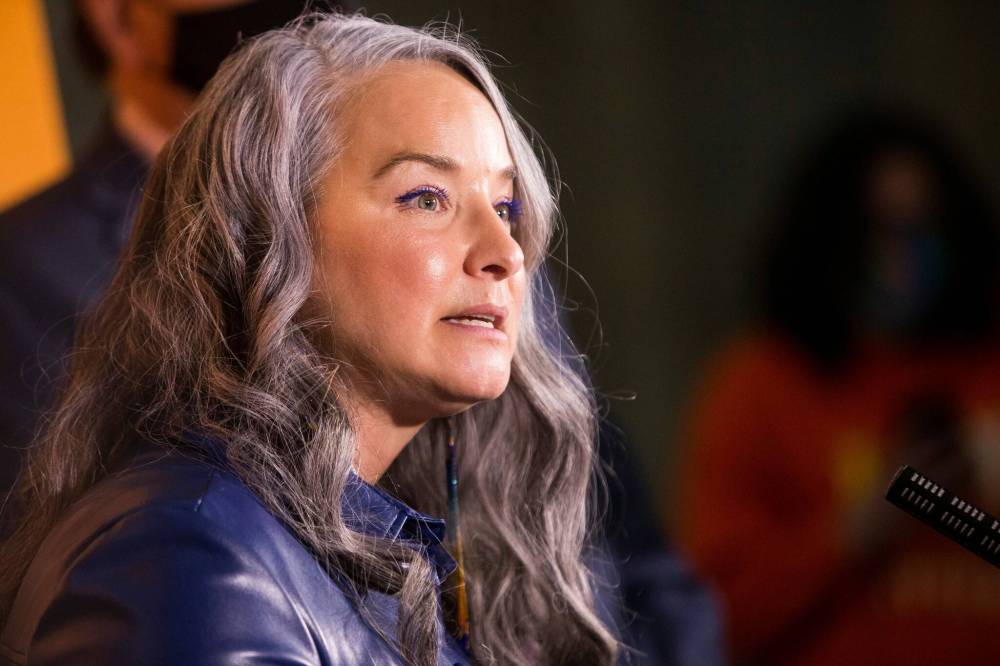A legacy left unfulfilled Ten years after inquiry into Phoenix Sinclair’s death, a third of judge’s 62 recommendations to improve Manitoba’s child-welfare system remain outstanding
Read this article for free:
or
Already have an account? Log in here »
To continue reading, please subscribe:
Monthly Digital Subscription
$0 for the first 4 weeks*
- Enjoy unlimited reading on winnipegfreepress.com
- Read the E-Edition, our digital replica newspaper
- Access News Break, our award-winning app
- Play interactive puzzles
*No charge for 4 weeks then price increases to the regular rate of $19.00 plus GST every four weeks. Offer available to new and qualified returning subscribers only. Cancel any time.
Monthly Digital Subscription
$4.75/week*
- Enjoy unlimited reading on winnipegfreepress.com
- Read the E-Edition, our digital replica newspaper
- Access News Break, our award-winning app
- Play interactive puzzles
*Billed as $19 plus GST every four weeks. Cancel any time.
To continue reading, please subscribe:
Add Free Press access to your Brandon Sun subscription for only an additional
$1 for the first 4 weeks*
*Your next subscription payment will increase by $1.00 and you will be charged $16.99 plus GST for four weeks. After four weeks, your payment will increase to $23.99 plus GST every four weeks.
Read unlimited articles for free today:
or
Already have an account? Log in here »
Hey there, time traveller!
This article was published 22/03/2024 (593 days ago), so information in it may no longer be current.
“To truly honour Phoenix, we need to provide all of Manitoba’s children with a good start in life, and offer to the most vulnerable an escape from the cycle of poverty and vulnerability that trapped Phoenix and her family … my hope is that the heart wrenching evidence I heard … will serve as a catalyst to ensure that the recommendations that emerge from this report are wholeheartedly embraced and implemented.”
— Ted Hughes, commissioner of the Commission of Inquiry into the Circumstances Surrounding the Death of Phoenix Sinclair
Supplied Phoenix Sinclair suffered broken bones and starvation at the hands of her mother and stepfather. She died at age 5 in 2005. A subsequent inquiry offered dozens of recommendations to improve the child-welfare system.
In a different world, Phoenix Sinclair would be about to celebrate her 24th birthday.
Phoenix was five when she died at the hands of her stepfather on June 11, 2005, while her birth mother watched, her tiny body recovered months later from a trash dump on the Fisher River Cree Nation.
The pair were convicted of first-degree murder, and a $14-million inquiry spanning two years looked into the circumstances of the child’s death.
Retired Judge Ted Hughes’ 900-page report dissected the failures of front-line social workers — who didn’t intervene during the months Phoenix suffered abuse, including starvation and broken bones in almost every part of her body — and the system as a whole while issuing 62 recommendations.
Ten years and three provincial governments later, 19 of Hughes’ recommendations still haven’t been fully implemented.
Mike Deal / Free Press files Justice Ted Hughes, who died in 2020 at 92, would be ‘disappointed and saddened,’ a colleague says.
Two critical ones — extending the age of youth receiving services to 25 and capping the number of child cases seen by social workers at 20 — are at zero compliance, a report produced by the Manitoba Advocate for Children and Youth says. There’s also been no action on the recommendation calling for an amendment to the Healthy Child Manitoba Act.
Hughes died in 2020, but Winnipeg lawyer Sherri Walsh, who served as commission counsel during the inquiry, said she knows what his response would be as nearly a third of his recommendations languish.
“Disappointed and saddened,” Walsh said. “Especially given the nature of the evidence the inquiry heard, the broad and consistent interest in the inquiry’s work from the public, and the inquiry’s mandate to make recommendations to better protect children, especially those who are the most vulnerable.”
The struggles Manitoba’s child-welfare system faces are well documented. There are about 10,000 kids in care — with a dramatic over-representation of children who are Indigenous — while the province’s rate of apprehension far surpasses all other Canadian jurisdictions.
As recently as last week, Winnipeg Police Service Chief Danny Smyth took the rare step of calling out the child-welfare system when he sounded the alarm about a string of violent crimes perpetrated by a small group of youths in care.
Wayne Glowacki / Free Press files The three-volume, 900-page report released in 2014 by Justice Hughes.
Manitoba Advocate for Children and Youth Sherry Gott is hopeful Manitoba’s NDP government will commit to implementing the outstanding recommendations.
Gott, who practised as a social worker, said the recommendation to cap each CFS worker’s caseload is critical.
“Our social workers carry a huge caseload,” she said. “Having 20 cases could (result in) more meaningful worker interactions than (just) putting out fires. Social workers can have meaningful work with families. They work with the entire family and they can make a difference.”
At the time, the inquiry heard the average caseload was 30. Phoenix had 27 different social workers during her life.
The Free Press reached out to the Manitoba College of Social Workers and the province to ask what a social worker’s caseload average is today. No one could provide an answer but said it was higher than 20.
Gott said the other unfulfilled recommendations — monitoring those in the system until age 25 — is also vital.
Most Manitoba children in care age out at 18, though some remain in the system until 21 in certain circumstances. Youth under the umbrella of the Manitoba Métis child-welfare system age out at 24.
John Woods / The Canadian Press files Sherry Gott, Manitoba Advocate for Children and Youth, says social workers have huge caseloads and capping them to 20 would make a big difference.
“Children are not ready to leave the system at 21,” Gott said. “Children need some supports as they transition to adulthood.”
A provincial spokesperson said in an email statement that work continues in consultation with Gott’s office to best address the original intents and findings of the report in keeping with systemic changes.
Brandon University political science Prof. Kelly Saunders said it comes as no surprise recommendations from the inquiry remain unfilled. Part of the challenge is that inquiries, such as Phoenix’s, touch upon multiple complex issues, including colonialism, genocide and generational trauma, she said.
“These aren’t easy things for a government to address even if it wants to make changes. It’s not just the child-welfare system, it is every area of government.”
That doesn’t mean the recommendations should be shelved or that inquiries into complicated issues should not proceed, she said. “It still behooves us to lay these things out.”
Kim Edwards was Phoenix’s godmother and looked after the child for much of her short life. Edwards spoke out at the time of Phoenix’s death, during the criminal trial and then the inquiry, promising to secure justice for the girl.
“Nothing has changed other than the government which is in power,” Edwards said. “We must implement them now. This is not her legacy. Her legacy was the Hughes report … but I believe the commissioner’s report will never be fully implemented. Too much time has passed.”
RUTH BONNEVILLE / FREE PRESS FILES Kim Edwards
The slow pace has been flagged multiple times, with child advocate reports from 2016 and 2021 raising concerns. There is also some debate whether some recommendations should be considered fully implemented.
Case in point: the inquiry recommended child-welfare workers be licensed and registered by the Manitoba College of Social Workers. But college registrar Barbara Temmerman says it’s still not a requirement since each agency has been given the authority to decide its own hiring process.
“We know there are unregistered practitioners working in multiple service agencies,” Temmerman said. “We’re not trying to make everyone a social worker. We just need to ensure there are qualified practitioners. These are some of the most vulnerable they work with.”
Derek Nepinak is now the chief of Minegoziibe Anishinabe, formerly Pine Creek First Nation. He was grand chief of the Assembly of Manitoba Chiefs when the inquiry released its recommendations.
Nepinak said at the time the AMC and chiefs across the province were beginning the process of taking over welfare responsibilities for Indigenous children.
“We saw lots of deficiencies in the province’s CFS structure,” he said. “At the same time, we were looking beyond the inquiry and its recommendations.”
It took much longer than the chiefs had hoped, but in 2019 the federal government passed Bill C-92, which allows Indigenous people to “build their own child-protection laws” and create a system that will help, rather than harm.
“If we learned anything from the inquiry, it was continuity of care,” he said. “When a file is being transferred from CFS to an Indigenous agency we have to make sure everything is done and no one slips through the cracks.”
Nepinak said that doesn’t mean they are throwing out everything CFS was doing for their children or the Hughes recommendations that have already been implemented.
“A lot of local agencies will look at best practices and incorporate them at the community level,” he said. “We won’t make wholesale changes. We want to rebuild with important connections to culture, to language and to extended family and community.”
Billie Schibler’s time as the province’s child advocate overlapped the short life of Phoenix. She expressed disappointment that the focus on transferring funding from Ottawa directly to Indigenous child-welfare services has meant Hughes’ report has “fallen off the radar.”
“Very sad,” she said in an email. “The late Justice Hughes made some very important recommendations that were committed to and should be honoured.”
Schibler said support services should be available minimally to at least age 21 and, ideally, aging-out individuals should be paired with social workers who specialize in how to access community resources that would ease the young adults’ transition into independence.
Nahanni Fontaine was involved in the Phoenix case long before becoming Manitoba families minister responsible for overseeing the province’s child-welfare system.
Before her political career, Fontaine worked for the Southern Chiefs’ Organization as its justice director. It was in that role in March 2006, when she stood in the bush at the Fisher Creek Cree Nation, along with the community’s chief, band councillors and elders, to take part in a ceremony for Phoenix shortly after parts of her body were discovered there.
“We had a ceremony with the elders and the chief and council in the bush 50 feet away from where this little baby’s bones were found.”–Nahanni Fontaine
“I will always remember that,” Fontaine said.
“There was still snow … we couldn’t go directly on, we were just on a path, because the RCMP had it all cordoned off. There was a tent, maybe 50 feet away from us, we had a ceremony with the elders and the chief and council in the bush 50 feet away from where this little baby’s bones were found.
“So, for me, and now all these years later, from being there in the very beginning to do a ceremony for this little one, and now, years later, to be the minister responsible for ensuring the recommendations are implemented, is a responsibility that I not only take very seriously, but certainly that I understand in the work I do as a sacred responsibility.”
Fontaine said her department is looking at the remaining recommendations during the transition of a large part of the current child-welfare system to Indigenous leadership.
“(It) is really about dismantling and decolonizing child welfare and really establishing where child welfare should have always been and that is in our communities with our leadership and our matriarchs.”
MIKAELA MACKENZIE / FREE PRESS files Families Minister Nahanni Fontaine says the child-welfare system needs to be dismantled and decolonized.
Fontaine said Peguis became the first First Nation in the province to take full control over child welfare in January 2023. Others, including the Manitoba Métis Federation and the Island Lake Tribal Council, are ready to take over jurisdiction or are moving on that path.
“What I always tell folks is there is no greater example of reconciliation than ensuring that children, and the child-welfare system, is under the jurisdiction of our own people,” she said. “To be able to rectify the damage that’s been done.
“I have told my department repeatedly that that is my priority now — jurisdiction.”
Fontaine said she understands the calls to extend services for people in the system until they’re 25.
“I know that they are considered adults, but they are still babies,” she said, referring to those who age out at 18. ”And especially if you have come from the system and especially if you have trauma, they are still children. They need support. And so that’s certainly a focus and a priority for me as minister of families.”
Fontaine said her government is committed to improving the lives of all children.
“Both the premier and myself, and our whole cabinet, recognize that this province must do better at ensuring that more Manitoba children make it to their 18th birthday,” she said.
The Manitoba Advocate for Children and Youth has flagged 19 recommendations from the Phoenix Sinclair inquiry as not being fully in compliance.
Non-compliant (0%):
Recommendation 54: That the province amend the Healthy Child Manitoba Act to reflect the rights entrenched in the United Nations Convention on the Rights of the Child, in a manner similar to Alberta’s Children First Act, stipulating that the well-being of children is paramount in the provision of all government services affecting children.
Insufficiently explained (0%):
Recommendation 12: That all ongoing services to families should be delivered on the basis of 20 cases per worker.
Recommendation 34: That the Child and Family Services Act be amended to allow for extension of services to any child who at the age of majority was receiving services under the Act, up to age 25.
Limitedly compliant (25%):
Recommendation 19: That the authorities each develop and implement a supervision policy including provisions that: a) articulate that the primary function of supervision is to ensure compliance with best practice; b) require that supervisors prepare written reports of supervision meetings with workers, with copies retained in the appropriate case file; c) stipulate that before approving the transfer or closing of a file, the supervisor must document the reason for approving the decision; d) require annual performance reviews to be conducted by a worker’s direct supervisor using an objective set of articulated criteria, developed in consultation with agency staff.
Recommendation 25: That the authorities be funded to a level that supports the differential response approach, including: a) funding to allow agencies to meet the caseload ratio of 20 cases per worker for all family services workers; b) increasing the $1,300 fund for family enhancement services to a reasonable level, especially for families who are particularly vulnerable, many of whom are Aboriginal; c) determination of the amount of necessary funding after meaningful consultation between agencies and the authorities, and between the authorities and government, after agencies have reasonably assessed their needs.
Recommendation 52: That supports for families transitioning from First Nation communities to urban centres be expanded and enhanced. To this end, Manitoba should collaborate with First Nations and other levels of government.
Recommendation 56: That a legislated committee, functioning under the provisions of the Healthy Child Manitoba Act (in its present or amended form) be charged with: a) coordinating the services provided for children and families, between community-based organizations and government departments; and b) allocating government funding to those community-based organizations, following meaningful and inclusive consultation. It is understood that funding from the private sector and other levels of government will continue to play an important role, as it has done, in supporting these organizations; and that the composition of this committee mirror the committee described by s. 21(3) of the Healthy Child Manitoba Act, which reflects Manitoba’s various regions and cultural diversity and includes representatives of the community and recognized experts.
Partially compliant (50%):
Recommendation 4: That every effort be made to provide continuity of service by ensuring that, to the extent reasonably possible, the same worker provides services to a family throughout its involvement with the child welfare system.
Recommendation 13: That the authorities and agencies explore ways to reduce administrative burdens on social workers through the better use of technology and administrative staff.
Recommendation 20: That the authorities each perform and publish annual composite reviews of the well-being of children who are receiving services from their agencies, or have received services within the past 12 months, whether in or out of care.
Recommendation 58: That child welfare agencies meet regularly with community-based organizations that serve their clients, to discuss how they can best work together to meet the community’s needs.
Largely compliant (75%):
Recommendation 1: That the province and the four child welfare authorities, who are responsible for the delivery of child welfare services, adhere to the following principles: a) the key to supporting families and protecting children is offering early intervention through both universal and targeted services, to prevent the vulnerability that leads to contact with the child welfare system; b) child-welfare services are provided on a continuum, focusing on protection in the face of an immediate threat to a child’s safety but almost always working with a family enhancement approach to keep children safe at home; c) once a family comes to the attention of the child-welfare system, the children’s safety and well-being must be assessed; this means assessing both immediate and long-term risk of harm, including chronic neglect, and it requires face-to-face contact; d) assessment tools must be used as an aid to, and not as a substitute for, the exercise of a worker’s clinical judgment; e) assessment tools must be used in a way that takes into account a family’s cultural, social, and economic circumstances; f) after an assessment of the child’s safety and well-being, and of the family’s strengths and needs, the necessary and appropriate services, as determined by the assessment, must be available; g) when a child has been found to be in need of protection, the goal of the child welfare system is to prevent recurrence of maltreatment and resulting impairment. This should be done by child-welfare agencies acting on their own or in partnership with community-based organizations and other government departments; h) the goal of the child-welfare system is to keep as many children safe at home as is possible.
Recommendation 2: That the province ensure that the family enhancement services required to support the differential response practice model are developed, coordinated, and made accessible, through partnerships and collaboration among the child-welfare system and other departments, and community-based organizations.
Recommendation 3: That All Nations Coordinated Response Network — whose role is triage and delivery of short-term services — no longer provide family enhancement services but should transfer families who need those services to a family services unit as soon as possible. Reason: This will avoid disruptions in service for families whose need.
Recommendation 7: That the authorities enhance availability of voluntary early intervention services by placing workers in schools, community centres, housing developments, and any other community facilities where they would be easily accessible.
Recommendation 14: That each authority designate staff who are available both during the day and after hours, to support the work of social workers by locating individuals through investigative means, and serving court documents as necessary.
Recommendation 36: That the position of a Manitoba Representative for Children and Youth be established under its own legislation, titled the Representative for Children and Youth Act, with these features: a) status as an officer of the legislature, with the same independence afforded to the ombudsman and auditor general; b) a mandate to advocate not only for children in the child-welfare system, but for all children and youth in the province who are receiving or are eligible to receive any publicly funded service; c) responsibility to review not only deaths, but also critical injuries to any child in care and any child who had been involved with child welfare during the previous year; and d) authority to make special reports to the Legislative Assembly where considered necessary, including reports on compliance with recommendations made previously by the representative under the act, such special reports to be delivered to the Speaker and the Standing Committee on Children and Youth.
Recommendation 48: That a public awareness campaign be undertaken to inform the public about the expanded mandate and role of the Representative for Children and Youth.
Recommendation 55: That the capacity of community-based organizations be enhanced by provision of sustained long-term funding to allow for delivery of holistic services, with particular emphasis on support for Aboriginal-led organizations and programs that promote cultural identity within Aboriginal communities.
kevin.rollason@freepress.mb.ca

Kevin Rollason is a general assignment reporter at the Free Press. He graduated from Western University with a Masters of Journalism in 1985 and worked at the Winnipeg Sun until 1988, when he joined the Free Press. He has served as the Free Press’s city hall and law courts reporter and has won several awards, including a National Newspaper Award. Read more about Kevin.
Every piece of reporting Kevin produces is reviewed by an editing team before it is posted online or published in print — part of the Free Press‘s tradition, since 1872, of producing reliable independent journalism. Read more about Free Press’s history and mandate, and learn how our newsroom operates.
Our newsroom depends on a growing audience of readers to power our journalism. If you are not a paid reader, please consider becoming a subscriber.
Our newsroom depends on its audience of readers to power our journalism. Thank you for your support.

